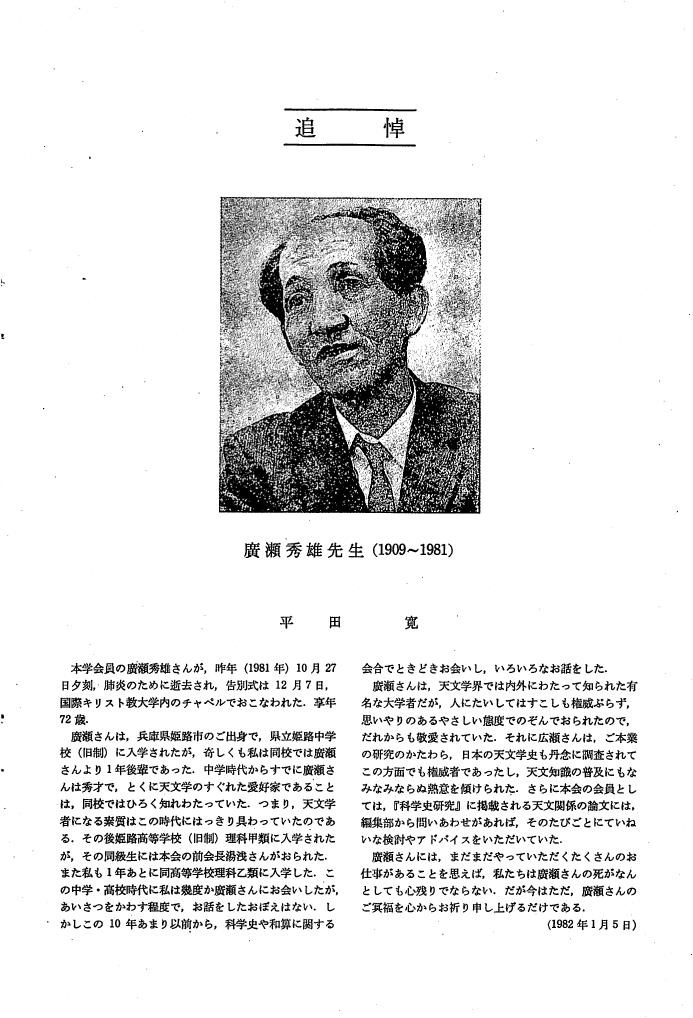1 0 0 0 OA 国立情報学研究所 次世代目録所在情報サービスの検討状況(<特集>目録の現状と未来)
- 著者
- 細川 聖二 平田 義郎 齊藤 泰雄 内藤 裕美子
- 出版者
- 一般社団法人 情報科学技術協会
- 雑誌
- 情報の科学と技術 (ISSN:09133801)
- 巻号頁・発行日
- vol.58, no.9, pp.442-447, 2008-09-01 (Released:2017-04-28)
- 参考文献数
- 12
国立情報学研究所では,目録所在情報サービス(NACSIS-CAT/ILL)の今後の在り方について,中長期的な視点で検討することを使命として,「学術コンテンツ運営・連携本部図書館連携作業部会」の下に「次世代目録ワーキンググループ」を設置した。ワーキンググループでの検討結果を「次世代目録所在情報サービスの在り方について(中間報告)」として取りまとめ,2008年3月末に公開した。本稿では,「中間報告」に至る検討の経緯および「中間報告」についてその概要を紹介する。
1 0 0 0 OA スクロール文字の移動速度がユーザの理解に及ぼす影響
- 著者
- 鈴木 崇也 中村 量真 平田 卓 相原 佑次 北 恭成 野本 弘平 中村 芳知 沢田 久美子
- 出版者
- 日本知能情報ファジィ学会
- 雑誌
- 日本知能情報ファジィ学会 ファジィ システム シンポジウム 講演論文集 第28回ファジィシステムシンポジウム
- 巻号頁・発行日
- pp.655-658, 2012 (Released:2013-07-25)
情報量が多いのに対し表示スペースが限られているヒューマンインタフェースでは,スクロール文字がよく用いられる.スクロール文字では,その移動速度が速いほど表示される情報量は多くなるが,同時に読むことは困難となる.スクロール文字は読みやすくなければならない.しかも,実際のヒューマンインタフェースでは,その文字が明確に認識し易い事だけでは不十分である.スクロール文字の文が困難なくユーザに理解されなければならないのである. 本研究では,スクロール文字をユーザに示す実験が行われ,彼らの理解の度合いが客観的に計測された.そしてスクロール文字の移動速度がユーザの理解に及ぼす影響が定量的に評価された.
1 0 0 0 OA 日本科学史学会創立と菅井準一先生(アゴラ)
- 著者
- 平田 寛
- 出版者
- 日本科学史学会
- 雑誌
- 科学史研究 (ISSN:21887535)
- 巻号頁・発行日
- vol.22, no.145, pp.51, 1983 (Released:2021-10-06)
1 0 0 0 OA 追悼 廣瀬秀雄先生(1909~1981)
- 著者
- 平田 寛
- 出版者
- 日本科学史学会
- 雑誌
- 科学史研究 (ISSN:21887535)
- 巻号頁・発行日
- vol.21, no.141, pp.57-58, 1982 (Released:2021-05-13)
1 0 0 0 OA 政治発展と政治体制
- 著者
- 平田 武
- 出版者
- 東欧史研究会
- 雑誌
- 東欧史研究 (ISSN:03866904)
- 巻号頁・発行日
- vol.32, pp.48-61, 2010 (Released:2019-04-14)
1 0 0 0 OA 1956年革命とハンガリー現代史研究
- 著者
- 平田 武
- 出版者
- 東欧史研究会
- 雑誌
- 東欧史研究 (ISSN:03866904)
- 巻号頁・発行日
- vol.30, pp.55-73, 2008 (Released:2019-04-14)
1 0 0 0 OA Romsics Ignac, Bethlen Istvan: Politikai eletrajz (Budapest, Magyarsagkutato Intezet, 1991), 356p.
- 著者
- 平田 武
- 出版者
- 東欧史研究会
- 雑誌
- 東欧史研究 (ISSN:03866904)
- 巻号頁・発行日
- vol.18, pp.78-81, 1995 (Released:2018-12-01)
- 著者
- 落合 知美 綿貫 宏史朗 鵜殿 俊史 森村 成樹 平田 聡 友永 雅己 伊谷 原一 松沢 哲郎
- 出版者
- 一般社団法人 日本霊長類学会
- 雑誌
- 霊長類研究 (ISSN:09124047)
- 巻号頁・発行日
- pp.31.001, (Released:2015-03-20)
- 参考文献数
- 70
- 被引用文献数
- 2 2
The Great Ape Information Network has collated and archived information on captive chimpanzees within Japan since 2002. As of July 1st, 2014, a total of 323 chimpanzees were housed within 52 facilities across Japan, all registered in the Japanese Association of Zoos and Aquariums (JAZA) studbook. JAZA has recorded information on captive chimpanzees within Japan since the 1980s. However, for individuals unregistered and/or deceased prior to this period, JAZA holds scant information. There are very few surviving reports on living conditions and husbandry of such individuals, particularly for the years preceding the Second World War (WWII) (up to 1945). Here we present the first detailed history of captive chimpanzees in Japan before WWII, following a systematic investigation of disparate records. The first record of any live chimpanzee within Japan was a chimpanzee accompanying an Italian travelling circus in 1921. The history of resident captive chimpanzees in Japan began in 1927 when a chimpanzee, imported into Japan by a visitor, was exhibited in Osaka zoo. In the 1930s, many chimpanzee infants were imported to Japanese zoos until in 1941 imports were halted because of WWII. By the end of WWII, there was only one single chimpanzee still alive within Japan, “Bamboo”, housed in Nagoya. In 1951, importation of wild chimpanzees into Japan resumed. In total, we identified 28 individuals housed within Japan before 1945, none listed previously in the JAZA studbook. Of these 28 individuals: 6 entered Japan as pets and/or circus animals, 21 were imported to zoos, and one was stillborn in zoo. Of the 21 zoo-housed individuals, 7 died within one year and 9 of the remaining 14 were dead within 5 years of arriving in Japan. Four individuals are recorded to have lived 7-8 years. Only one male individual, the aforementioned “Bamboo”, lived notably longer, to about 14 years.
1 0 0 0 OA 社会調査研究センターと毎日新聞社世論調査室
- 著者
- 平田 崇浩
- 出版者
- 公益財団法人 日本世論調査協会
- 雑誌
- 日本世論調査協会報「よろん」 (ISSN:21894531)
- 巻号頁・発行日
- vol.126, pp.49-51, 2020 (Released:2021-12-21)
1 0 0 0 OA 急性扁桃炎に対するレボフロキサシン1日400mg分2投与の検討
- 著者
- 近藤 律男 平田 佳代子 谷垣 裕二 堀内 長一 佃 守
- 出版者
- 耳鼻咽喉科展望会
- 雑誌
- 耳鼻咽喉科展望 (ISSN:03869687)
- 巻号頁・発行日
- vol.48, no.1, pp.46-52, 2005-02-15 (Released:2011-03-18)
- 参考文献数
- 7
- 被引用文献数
- 2
レボフロキサシン (LVFX) はニューキノロン系抗菌薬であり, postantibiotic effect (PAE) を有し抗菌作用は濃度依存的である。この事実より肺炎や急性上気道炎に対しレボフロキサシン1日400mg分2投与法の有用性が報告されている。急性上気道炎については大部分がウイルス感染であり, 自然治癒することも多いため, 本研究では急性上気道炎の中でもより細菌感染の頻度が高いと考えられる急性扁桃炎に対し, レボフロキサシン1日400mg分2投与法による臨床効果および有効性について, 1日300mg分3投与法と封筒割付け法により分別し比較検討した。対象はレボフロキサシン1日400mg分2投与群25例.レボフロキサシン1日300mg分3投与群25例である。解析方法はデータの質に応じ, X2検定, t検定, Wilcoxon順位和検定をそれぞれ用いた。なお有意水準は5%とした。臨床効果, 治癒率, 平均治癒日数などすべての項目で有意差は認めなかったものの, 400mg分2投与法の有効性と安全性が確認された。また服薬コンプライアンスの点では400mg分2投与法は300mg分3投与法と比較し, より優れた投与法であると考えられた。
1 0 0 0 キリンのまだら : 自然界の統計現象
1 0 0 0 物理実験を始める人のために
1 0 0 0 割れめ
- 著者
- 平田森三撮影
- 出版者
- 平田森三先生還暦記念会
- 巻号頁・発行日
- 1967
1 0 0 0 基礎物理学実験 : 大学実習
1 0 0 0 物理実驗を始める人のために
1 0 0 0 OA 伝達情報の変換による遠隔制御法と検証実験
- 著者
- 小木曽 公尚 平田 研二
- 出版者
- THE INSTITUTE OF SYSTEMS, CONTROL AND INFORMATION ENGINEERS (ISCIE)
- 雑誌
- システム制御情報学会論文誌 (ISSN:13425668)
- 巻号頁・発行日
- vol.26, no.5, pp.156-164, 2013 (Released:2013-08-15)
- 参考文献数
- 21
- 被引用文献数
- 1
This paper proposes a remote control method for a linear system with pointwise-in-time state and/or control constraints. Our technique guarantees achievement of tracking performance and constraint fulfillment under simultaneous occurrence of some phenomena over communication links, such as arbitrary and unforeseeable delays and lots of packet losses. Our ideas are to feedback information about not a state but a state-existing area and to share maximal output admissible sets with reference governor and switching control strategy that consist of the proposed technique. Through numerical and experimental examples, we demonstrate effectiveness of the proposed method.
1 0 0 0 OA 教育の質保証の視点から見た薬学教育の在り方─第1期薬学教育第三者評価を終えて─
- 著者
- 平田 收正
- 出版者
- 公益社団法人 日本薬学会
- 雑誌
- YAKUGAKU ZASSHI (ISSN:00316903)
- 巻号頁・発行日
- vol.142, no.8, pp.829-836, 2022-08-01 (Released:2022-08-01)
- 参考文献数
- 9
The first-phase third-party accreditation conducted by the Japan Accreditation Board for Pharmaceutical Education between FY 2013 and 2019 revealed various issues regarding current pharmacy education programs. In addition, the report of the Ministry of Health, Labour and Welfare's Study Group on the Training and Quality Improvement of Pharmacists, which was published in 2021, identified a broad range of issues in pharmaceutical education related to pharmacist training and quality improvement. Many of these issues are concerned with university curricula; thus, in order to ensure and enhance the quality of pharmaceutical education and develop pharmaceutical human resources that society demands, it is extremely important for each university to improve its curricula. Since revision of the model core curriculum for pharmaceutical education is currently underway, in this symposium, we held a discussion to identify points that need to be improved regarding the current model core curriculum to ensure and enhance the quality of pharmaceutical education in light of the above-mentioned issues, and incorporate the corresponding measures into the basic policy for revision of the model core curriculum.
1 0 0 0 OA ホワイトヘッドの知覚論と生態学的知覚論
- 著者
- 平田 一郎 Ichiro Hirata
- 出版者
- 関西外国語大学・関西外国語大学短期大学部
- 雑誌
- 研究論集 = Journal of Inquiry and Research (ISSN:03881067)
- 巻号頁・発行日
- vol.108, pp.1-19, 2018-09
本稿はJ.J. ギブソンの生態学的知覚論と、相互関係的な過程存在論という点でギブソンと立場を同じくするホワイトヘッドの知覚論を比較して、知覚や自然についての見方を深めようとする。まずギブソンの知覚論において特徴的な直接知覚論やアフォーダンスを取り上げ、ホワイトヘッドの主張と通じるところがあることを示した。しかし神経生理学的な問題、アフォーダンスの特定化の問題では、ホワイトヘッドによって補える部分がある。さらにギブソンの知覚の問題点を示した。それは過去の知覚物が現在のものとして現前している時、何らかの「表象」を認めざるを得ないのでは、という問題である。その点でホワイトヘッドの知覚論では直接知覚を根底に置きながら、表象の可能性を残している。総じてホワイトヘッドの哲学は、ギブソンの生態学的知覚論の主張を包含しながらも、それを補える部分が多いということを示した。
1 0 0 0 OA ヒラメ幼稚魚の生残, 成長および飼育環境に及ぼすアナアオサ変異種のフィードバック飼育効果
- 著者
- 許 波濤 平田 八郎
- 出版者
- Japanese Society for Aquaculture Science
- 雑誌
- 水産増殖 (ISSN:03714217)
- 巻号頁・発行日
- vol.40, no.2, pp.207-213, 1992-06-20 (Released:2010-03-09)
- 参考文献数
- 22
1) ヒラメ幼稚魚の生残, 成長, 飼育環境に及ぼすアナアオサ変異種のフィードバック効果を知るため, 供試魚とアオサの併用培養によるフィードバック投餌区 (A) , 無アオサ併用培養による無フィードバック区 (B) 及び毎日約85%ずつ自然海水と交換した海水交換区 (C) の3実験区を設定し, 22±1.0℃の恒温室で90日間にわたり飼育実験を行った。2) A・B・C区における実験によりは, ヒラメの生残率はそれぞれ92.9%, 14.3%および85.7%, 日間成長率はそれぞれ2.19%, 2.04%および2.17%, また, 飼料係数はそれぞれ0.95, 6.34および1.16であり, いずれもA区のほうがB・C区より優れた結果が得られた。3) A・B・C区における三態窒素およびPO4-Pの実験期間の平均濃度は, NH4-Nでそれぞれ4.4, 26.0および4.5, μg-at・l-1, NO2-Nでそれぞれ0.8, 8.5および1.1μg-at・l-1, NO3-Nでそれぞれ7.0, 35.3および5.8μg-at・l-1, またPO4-Pでそれぞれ3.8, 6.7および2.6μg-at・l-1であり, アオサの併用培養によるヒラメの飼育環境保全に効果が得られた。






